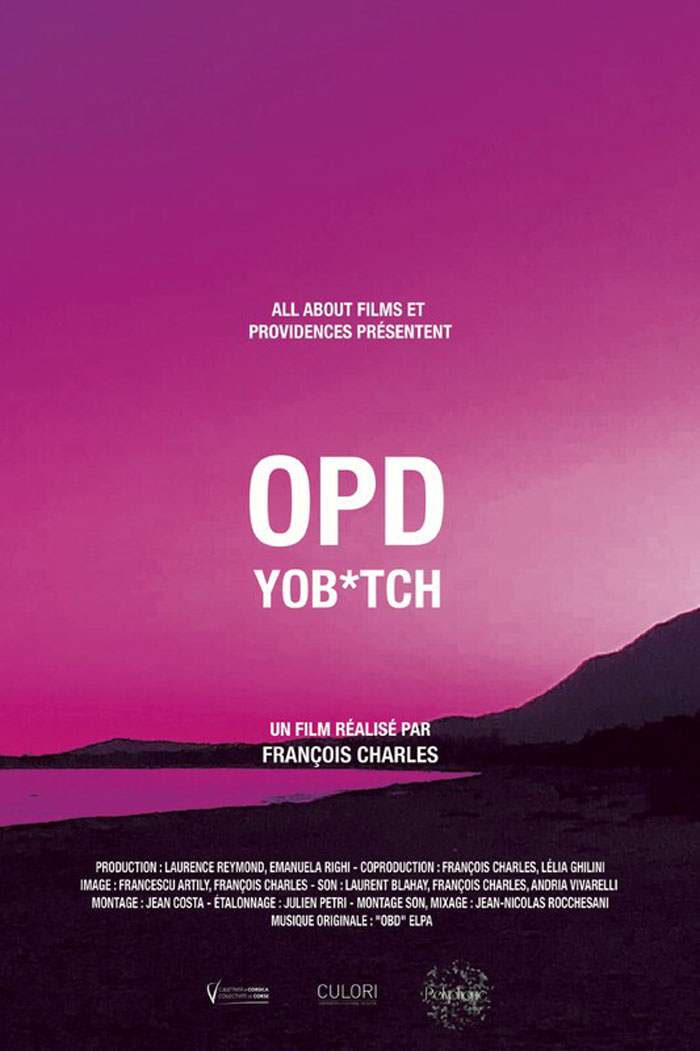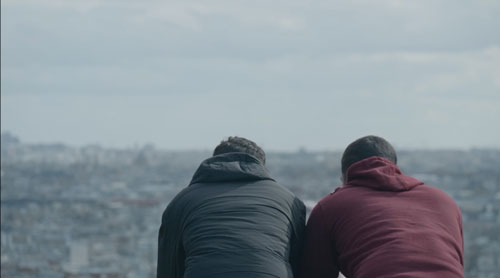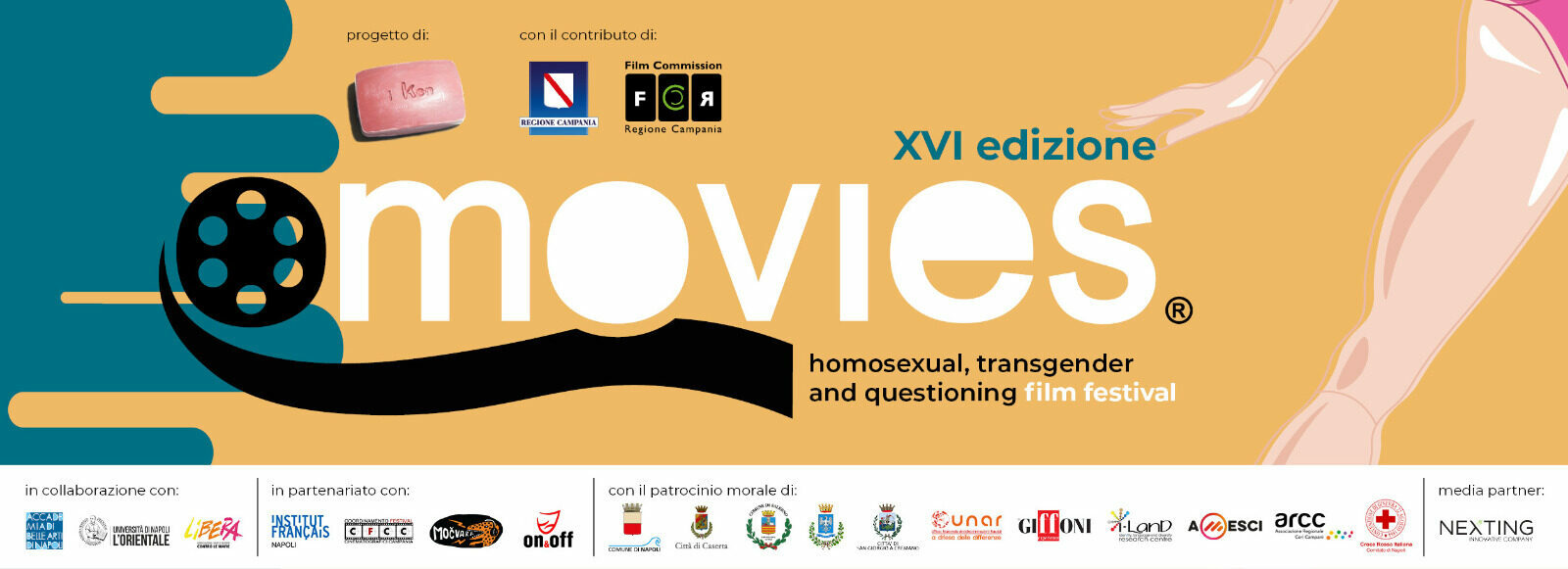
🇮🇹
OPD (Francia, 2022, 36’)
Categoria: Mediometraggio
Genere: Documentario
Produttore: Laurence Reymond, Emanuela Righi
Regia: François Charles
Sceneggiatura: François Charles
Fotografia: Francescu Artily, François Charles
Montaggio: Jean Costa
Cast: Marc-Antoine, Jessica, Aurélien, Florian, Judicael, Laurent

Sinossi:
Nel 2016, ho iniziato un’indagine all’interno della comunità gay in Corsica, e nella sua diaspora oltre 1000km2 di territorio metropolitano francese. Come se riempissi un vuoto di rappresentazione con un documentario. Per combattere l’omertà. I problemi rimanenti per le persone a causa del modo in cui amano, sono, in Francia, dall’isola della bellezza. E esprimere l’amore e la rabbia del cinema. Il corto è stato selezionato per quattro Festival: Lama film Festival (2023), Flickers’ Rhode Island International Film Festival (2023), Arte Mare (2023) e Corsicadoc (2023).
Parole del regista: “Dirigere OPD (YOB*TCH) è stata un’esperienza che ha cambiato la vita. Considero questo film il film più personale, politico e significativo che ho fatto finora. Non solo l’ho scritto con le parole. Ma ho anche girato e suono registrato una parte significativa di esso. Tecnicamente scritto con una fotocamera e microfono. Oltre al fantastico lavoro fornito dai miei compagni di equipaggio. E anche, prendendo parte al processo di produzione, come coproduttore, lottando per l’esistenza di questo film perché ci credo.
È anche un film in cui compaio, attraversando la linea da una posizione di osservatore dietro la telecamera, a diventare un “personaggio” nell’occhio della fotocamera. Un film in cui espongo, mi esprimo come parte della comunità rappresentata. Ed era importante farlo. C’era uno scopo artistico e politico dietro quella scelta, in termini di rappresentazione.
Per essere chiari, non è mai stato un viaggio di ego. Ma un modo, prima di tutto, per esprimere come il cinema è stato essenziale nel mio percorso. E come può servire come un apri occhi, salvare vite dall’isolamento, oscurità, sollevare anime e spiriti, come ha fatto per me. Come YOB*TCH parla dell’amore per il cinema. La rabbia del cinema. “L’amore è la rabbia” (in lingua corsa) del cinema.
Ed era anche un modo per usare una posizione privilegiata, come individuo che ha attraversato un lungo viaggio di accettazione di sé come uomo gay, e anche come artista, un regista, per cercare di essere parte di un processo liberatorio per coloro che non possono, a causa di un’attrazione sessuale, e una transitorietà. Come ci sono ancora una maggioranza, credo, non solo in Corsica, Francia, Europa, ma in tutto il mondo. Lasciate che YOB*TCH essere un ricordo di questo.
Fare questo film mi ha aiutato a capire quanto non fossimo affatto allo stesso passo nelle nostre costruzioni come individui, parti di gruppi minoritari. Come minoranze, in termini di rappresentanza politica secondo dove vivevamo. Ed era importante per ripristinare le cose, dalla Corsica, un luogo à parte della Francia metropolitana. Per ricordare che anche in un paese occidentale, sviluppato, ci sono ancora questioni vivide, reali, crudeli per gli emarginati, a causa del modo in cui amano, il modo in cui sono. Soprattutto, per i silenziosi, gli invisibili. In territori periferici. Luoghi isolati ecc.
E tenete a mente che questo film ha fatto molta strada. So che la sua modalità narrativa, il minimalismo della sua estetica potrebbe essere aperto alla critica. Questo è ciò che i film sono. Ma per coloro che hanno avuto il coraggio di parlare, a volte appaiono nel film, è stato pionieristico.
Come è in Corsica e in molti luoghi della terra, non così ovvio, non così facile, ancora trasgressivo, non è la norma assoluta per identificarsi con l’identità queer. E assolutamente terrificante, problematico per molti di noi, che rappresentano, credo, la grande maggioranza invisibile e silenziosa della nostra comunità globale. Per le persone solo per essere chi sono. Per essere semplicemente liberi.
E per tutte queste ragioni, ho dovuto tornare alle basi. Per un approccio minimalista di espressione cinematografica, parte del processo di riprese documentarie, prima di tutto. Solo in termini di rappresentazione della realtà, discorso liberatorio, e in termini di visibilità. E a questo proposito, spero sinceramente che troverete il film raggiunto.”
Biofilmografia:
François Charles nasce a Bastia, in Corsica, nel 1983. Fin dalla tenera età, è attraverso i film che ha visto una fuga, considerando il cinema come “la luce nel buio di un’adolescenza gay in un luogo piccolo e isolato” che lo ha ispirato a perseguire una carriera come autore e regista. Dopo il diploma di scuola superiore, ha trascorso un anno come studente di scambio negli Stati Uniti, poi si è trasferito a Parigi per studiare Cinema, frequentando la scuola ESEC di film, poi Paris 1 La Sorbonne Master in storia del cinema prima di iniziare a lavorare su set cinematografici. Dal 2006, ha lavorato in molti film per la televisione e le sale, in particolare lavorando nel reparto casting negli ultimi anni, collaborando con registi francesi di fama, mentre dirigeva i suoi film prima di diventare un attivista lgbt+ in Corsica. OPD (YOB*TCH) è finora il suo film più personale e politico, di cui è anche coproduttore.
🇬🇧
OPD (France, 2022, 36’)
Category: Medium-length film
Genre: Documentary
Producer: Laurence Reymond, Emanuela Righi
Director: François Charles
Screenplay: François Charles
Photography: Francescu Artily, François Charles
Editing: Jean Costa
Cast: Marc-Antoine, Jessica, Aurélien, Florian, Judicael, Laurent
Synopsis:
In 2016, I began an investigation within the gay community in Corsica, and in its diaspora over 1000km2 of French metropolitan territory. As if I filled a void of representation with a documentary. To fight silence. The remaining problems for people because of the way they love, are, in France, from the island of beauty. And express the love and anger of cinema. The short was selected for four Festivals: Lama film Festival (2023), Flickers’ Rhode Island International Film Festival (2023), Arte Mare (2023) and Corsicadoc (2023).
Words from the director: “Directing OPD (YOB*TCH) was a life-changing experience. I consider this film the most personal, political and significant film I have made so far. I didn’t just write it with words. But I also shot and sound recorded a significant portion of it. Technically written with a camera and microphone. In addition to the fantastic work provided by my crewmates. And also, taking part in the production process, as a co-producer, fighting for the existence of this film because I believe in it.
It is also a film in which I appear, crossing the line from an observer position behind the camera, to becoming a “character” in the eye of the camera. A film in which I exhibit, I express myself as part of the community represented. And it was important to do so. There was an artistic and political purpose behind that choice, in terms of representation.
To be clear, it was never an ego trip. But a way, first of all, to express how cinema has been essential in my journey. And how it can serve as an eye opener, save lives from isolation, darkness, lift souls and spirits, as it has done for me. How YOB*TCH talks about the love of cinema. The anger of cinema. “Love is anger” (in Corsican language) of cinema.
And it was also a way to use a privileged position, as an individual who has gone through a long journey of self-acceptance as a gay man, and also as an artist, a filmmaker, to try to be part of a liberating process for those who cannot, due to a sexual attraction, and a transience. As there are still a majority, I believe, not only in Corsica, France, Europe, but throughout the world. Let YOB*TCH be a reminder of this.
Making this film helped me understand how we were not at all on the same page in our constructions as individuals, parts of minority groups. As minorities, in terms of political representation according to where we lived. And it was important to restore things, from Corsica, a place à part of metropolitan France. To remember that even in a Western, developed country, there are still vivid, real, cruel issues for the marginalized, because of the way they love, the way they are. Above all, for the silent, the invisible. In peripheral territories. Isolated places etc.
And keep in mind that this movie has come a long way. I know that his narrative mode, the minimalism of his aesthetic could be open to criticism. That’s what movies are. But for those who dared to speak out, sometimes appearing in the film, it was groundbreaking.
As it is in Corsica and in many places on earth, not so obvious, not so easy, still transgressive, it is not the absolute norm for identifying with queer identity. And absolutely terrifying, problematic for many of us, who represent, I believe, the great invisible and silent majority of our global community. For people to just be who they are. To simply be free.
And for all these reasons, I had to go back to the basics. For a minimalist approach to cinematic expression, part of the documentary filming process, first and foremost. Only in terms of representation of reality, liberating discourse, and in terms of visibility. And in this regard, I sincerely hope that you will find the film achieved.”
Biofilmography:
François Charles was born in Bastia, Corsica, in 1983. From an early age, it was through films that he saw an escape, considering cinema as “the light in the darkness of a gay adolescence in a small and isolated place” that inspired him to pursue a career as an author and director. After graduating from high school, he spent a year as an exchange student in the United States, then moved to Paris to study Cinema, attending the ESEC film school, then Paris 1 La Sorbonne Masters in Film History before starting to working on film sets. Since 2006, he has worked on many television and theatrical films, notably working in the casting department in recent years, collaborating with renowned French directors, while directing his own films before becoming an LGBT+ activist in Corsica. OPD (YOB*TCH) is his most personal and political film so far, which he also co-produced.
